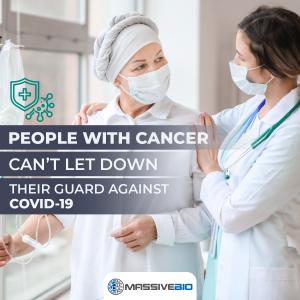COVID-19 poses a risk to people with cancer, especially those with leukemia, lymphoma, and other cancers of the blood. Taking precautions can lower the risk.
NEW YORK, USA, December 19, 2022 /EINPresswire.com/ -- People with cancer who become infected with the virus that causes COVID-19 have
an increased risk for severe symptoms. The threat is particularly serious for people with blood cancers, who appear to be more likely to require hospitalization and have a greater risk of dying from COVID-19 than patients with solid tumors.Patients with blood cancers may have heard or read online that the COVID-19 vaccine won’t work for them, and others may have relaxed protective measures they took at the height of the pandemic. Yet, it’s critical for all cancer patients to continue guarding against COVID-19, says Arturo Loaiza-Bonilla, MD, chief medical officer and co-founder of Massive Bio, which uses artificial intelligence to match cancer patients to clinical trials of new oncology treatments.
Cancer patients should take the following steps:
- Stay up to date with COVID-19 vaccinations. The new COVID-19 booster has been available since September. If you haven’t received the booster, or you still haven’t been vaccinated, you may wonder whether you should. It’s true that these protective shots in the arm appear to have less efficacy in some people with blood cancers. That’s because patients with leukemia, lymphoma, and other blood cancers often have abnormal or depleted levels of immune cells that produce antibodies against viruses. However, it’s still worth getting the COVID-19 vaccine. Studies indicate that the immune systems of many patients with blood cancer who receive the COVID-19 vaccine and become infected with the virus can produce a potent response of protective T cells, which can help lower the risk for serious illness. The Centers for Disease Control and Prevention recommends that everyone six months and older receive the COVID-19 vaccination, including all cancer patients. If you are receiving treatment for blood cancer, ask your doctor about the optimal timing for getting the COVID-19 vaccine or booster.
- Talk to your doctor about pre-exposure treatment. Receiving the antibody treatment Evusheld (tixagevimab plus cilgavimab) may help protect against COVID-19. The U.S. Food and Drug Administration (FDA) granted Evusheld Emergency Use Authorization and recommends the drug for people who have moderately to severely compromised immune systems or do not have an adequate immune response to COVID-19 vaccination due to a medical condition or treatment, including people with blood cancers. The FDA recently announced that Evusheld’s protection against certain COVID-19 variants might be waning, so the agency advises patients who have received the drug to test for the infection and see a doctor as soon as possible if they develop symptoms. If you do become infected, ask your doctor about the antiviral drug Paxlovid (nirmatrelvir and ritonavir), which can reduce the risk for severe symptoms.
- Wear a mask in public. While the rules about wearing a protective mask in public have been relaxed in many localities, people with cancer should continue to cover up in public. Choose a surgical or N95 mask.
- Rethink attending that ballgame or show. Avoiding crowds is especially important if you are currently receiving chemotherapy or other treatment.
Loaiza-Bonilla also suggests that if you have cancer, ask loved ones to take an at-home COVID-19 test before they visit. But don’t let concerns about the virus interfere with spending time among family and friends. “Take advantage of the weather and try to enjoy activities outside,” says Loaiza-Bonilla.
Sources:
Mortality of COVID-19 in Patients with Hematological Malignancies Versus Solid Tumors: A Systematic Literature Review and Meta-Analysis | Blood | American Society of Hematology (ashpublications.org)
Patients with hematologic cancers are more vulnerable to COVID-19 compared to patients with solid cancers - PMC (nih.gov)
The outcome of COVID‐19 in patients with hematological malignancy - Yigenoglu - 2021 - Journal of Medical Virology - Wiley Online Library
About Massive Bio
Massive Bio empowers cancer patients to find their best treatment options, providing convenient access and enrollment services for oncology clinical trials worldwide, powered by advanced artificial intelligence. Founded on the belief that all people should have equal access to leading-edge therapies, Massive Bio combines its best-in-class AI platform with expertise in genomics, engineering, and data analytics to remove the many barriers to cancer patient enrollment and participation in clinical trials. Headquartered in New York City, Massive Bio is a privately held company that operates in 12 countries.


No comments:
Post a Comment